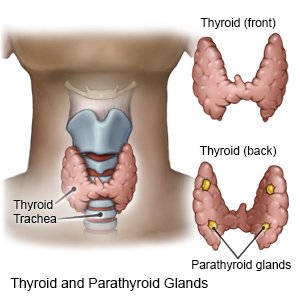Subclinical Hyperthyroidism
Medically reviewed by Drugs.com. Last updated on Aug 4, 2025.
AMBULATORY CARE:
Subclinical hyperthyroidism
is a condition that develops when the amount of thyroid stimulating hormone (TSH) in your blood is low. TSH is made in the brain and controls how much thyroid hormone is made. Thyroid hormones help control body temperature, heart rate, growth, and weight. Subclinical hyperthyroidism can lead to hyperthyroidism.
 |
Common signs and symptoms of subclinical hyperthyroidism:
The signs and symptoms may develop slowly, sometimes over several years.
- Weight loss, increased appetite, diarrhea, or constipation
- Increased sweating and heat intolerance
- Nervousness, restlessness, tremors, and difficulty sleeping
- Fast heart rate and fast breathing, even at rest
- Painful lump in your neck or bulging eyes
- Fatigue and muscle weakness
- Decreased or absent monthly periods
Call 911 for any of the following:
- You have sudden chest pain or shortness of breath.
- You have a seizure.
- Your heart is beating faster than usual.
- You feel like you are going to faint.
Related medications
Contact your healthcare provider if:
- You have a fever.
- You have pain, redness, and swelling in your muscles and joints.
- Your signs and symptoms return or become worse.
- You have questions or concerns about your condition or care.
Treatment
may not be needed. If you do need treatment, you may need any of the following:
- Antithyroid medicines decrease thyroid hormone levels and your symptoms.
- Radioactive iodine is given to damage or kill some thyroid gland cells. This may decrease the amount of thyroid hormone produced. Tell your healthcare provider if you know or think you are pregnant. This medicine can be harmful to an unborn baby.
- Surgery may be done to remove all or part of the thyroid gland.
Treatment options
The following list of medications are related to or used in the treatment of this condition.
Nutrition:
You may need to eat more to give your body the extra energy it needs. Foods high in protein will help prevent weight loss. Ask your healthcare provider which foods are best for you.
Follow up with your healthcare provider as directed:
You may need to return for more blood tests to check your thyroid hormone level. This will show if you are getting the right amount of medicine. Do not stop taking your medicines without talking to your healthcare provider first. Write down your questions so you remember to ask them during your visits.
© Copyright Merative 2025 Information is for End User's use only and may not be sold, redistributed or otherwise used for commercial purposes.
The above information is an educational aid only. It is not intended as medical advice for individual conditions or treatments. Talk to your doctor, nurse or pharmacist before following any medical regimen to see if it is safe and effective for you.
Learn more about Subclinical Hyperthyroidism
Treatment options
Care guides
Symptoms and treatments
Medicine.com guides (external)
Further information
Always consult your healthcare provider to ensure the information displayed on this page applies to your personal circumstances.
